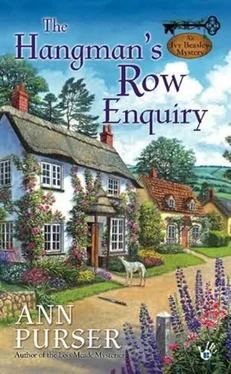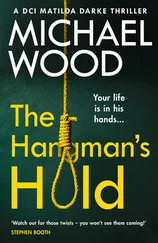Now she made her way downstairs to supper. Mr. Goodman was waiting at his table, and beckoned her over with a ready smile. She sighed. She would rather have had a quiet meal on her own, but knew that the old boy might well have remembered more about those early days, and the case of the disappearing mother.
“Good evening, Mr. Goodman,” she said.
“Good evening, Miss Beasley,” he said, and wondered when it would be safe to call her Ivy.
Ivy looked round for Gus, but he had not yet come down. “We must keep a seat for Mr. Halfhide,” she said, and felt uncomfortable when she saw the old man’s face fall.
“Had hoped to have you to myself,” he whispered.
Ivy was in unfamiliar territory here, and said clumsily that Mr. Halfhide was convalescing and good company was part of his recovery programme. She saw Gus approaching, and with relief waved him to their table. When Gus saw that she was sitting with little Roy Goodman his heart sank. He thought that Ivy should at least have been prepared to defend him from the oldest inhabitant.
After they had made short work of roast chicken and apple crumble, the three sat on over coffee, chatting idly. Then Roy Goodman said something that made Ivy sit up. “When I was a lad,” he began, “this was a private house, you know. Belonged to one of the Roussel family. They’d got a tenant in. A real recluse, she was. Never went anywhere, and had a woman looking after her. It was after she died that it was sold, and became an old folks’ home.”
“When was that?” Ivy said, and her tone made Gus look at her enquiringly.
“Oh, I’m not sure,” Roy said. “I’m so old, I sometimes think I remember Queen Victoria!”
“Rubbish!” said Ivy, and added that she was not so far behind Mr. Goodman, and she could barely remember her mother telling her about Queen Mary. She looked around the dining room, and said that it must have been a lovely house when it was in private hands. “Did you ever come here, Roy?” she said, apparently casually.
Roy beamed. “Well, Ivy,” he said, reaching out and touching her hand lightly, “I do vaguely remember that my mother sent me to Springfields to deliver a parcel that had been mistakenly sent to the farm. But the recluse didn’t answer the door. It was the companion. Yes, that’s right, she was called the companion. A quiet woman, she was. Not much seen about the village herself. Just came to the village shop for supplies, and that was about it.”
“Not to church?” said Ivy.
Roy shook his head. “Never to my knowledge. And I was in the church choir at that time. Sixpence a time, we got. That’s why we went, I’m afraid, not for the love of the Lord!”
Gus smiled. He had been thinking about the companion. “I don’t suppose you could possibly remember who the parcel was addressed to?” he said. It was a forlorn hope, but worth asking.
“Good heavens, no!” Roy said. “I was in a hurry to hand it in and get away. There was something creepy about the place in those days.” He paused, and then said politely, “Um, I wonder if you’d mind telling me why you’re so interested in those old long-gone days?”
Gus looked at Ivy, and after a second or two she nodded almost imperceptively. Gus got the message and cleared his throat.
“We should probably have told you before, Roy,” he said, “those old days may be very important to us.” Then he explained about being more or less thrust into matters surrounding the death of Mrs. Blake, and his decision to use his considerable experience in the field of investigation. “Being a stranger to the village, I needed a well-placed local assistant. That’s Ivy here,” he added, patting her hand, which she withdrew instantly. “And then she enlisted her cousin Deirdre at Tawny Wings, who has all the advantages of modern technology at her fingertips. And,” he added, “though it is probably too premature to say so, we are a pretty good team.”
Roy looked at them in astonishment. “Now I see it,” he said. “But you forgot the person who could be most useful to you.”
“Well, don’t beat about the bush,” said Ivy. “Who?”
“Me,” said Roy. “Meet your new team member.” He held out his hand, and neither Ivy nor Gus had the heart to refuse him.

DEIRDRE WANDERED ABOUT the house, smoking a cigarette and being careful not to inhale. She had smoked only in stressful circumstances since Bert died, and was now suffering terrible morning-after pangs of conscience. The euphoria of yesterday had dispersed, and she had taken a hard look at herself. A trollop, her mother would have said. That’s what you are, a trollop. A woman without pride or moral sense. Led astray in middle age by a former lover, who had never been a reliable character, even in his youth.
But had they done anybody any harm? Deirdre stopped her perambulating and stubbed out her cigarette. She frowned, and walked over to the grand piano, shining pristinely in the drawing room. It was never played. Tuned regularly, but never played. She had fallen for the sales talk: “The ultimate fashion statement for your home,” the advertisement had promised. At one time she’d hoped her girls would learn to play, but they had preferred the guitar. Much easier, they had said.
Now it was a suitable surface for expensively framed photographs of the family. She picked up the one of Bert and herself outside the Palace. He’d been so proud of her MBE. He had really deserved to have an award himself. His work with misguided youth in the town was well-known, but only she knew how much it had cost him. All those evenings spent in draughty community halls, when he would much rather have been at home watching the telly with her.
“Bert,” she said seriously. “I don’t suppose you could possibly let me know somehow whether I’m going astray, could you? Please?” Her eyes filled with tears, and she stared hopefully at the photograph. What! She rubbed her eyes fiercely. Oh, my God, there it was again. Bert winked. He definitely winked!
She rushed to the window with the photograph and looked again. No, it must have been a mistake. He looked proudly out of the photograph, as before. She sighed. Wishful thinking, she supposed. She replaced Bert, and opened the garden door. The sky was overcast, and a damp mist filled the garden. Almost autumnal, Deirdre thought. That’s what we are, she thought miserably. In the autumn of our lives.
“Deirdre!” A sharp voice interrupted her thoughts. “Have you been smoking?”
It was Ivy of course. Who else would Bert send along to accuse her of being sorry for herself? Deirdre laughed aloud, and did a couple of skips back into the house.
“You could do with a doormat outside there,” Ivy said. “Just look at those wet footprints all over your carpet! Still, if you will have white carpets, what do you expect?”
“Nice to see you, too, Ivy,” Deirdre said, quite restored. “Tea or coffee? I heard on the radio this morning that coffee is really bad for you. Shall we have tea?”
Ivy said she was too old to worry about whether things were bad for her or not, but she preferred tea in any case, hot and strong with two sugars, please.
“Now,” she continued, when they were perched on uncomfortable stools in the kitchen, “I reckon you have something to tell me. No, don’t interrupt. I think you said nothing to Theo Roussel about Beatrice Beatty’s past. I think you spent a happy and fruitless two hours exchanging tweetie words and getting up to no good. Am I right?”
Deirdre thought of lying through her teeth, and then realised that Ivy already knew the truth and it would be easier to own up. “Right,” she said apologetically. “Well, not all right. I wouldn’t say it was completely fruitless.”
Читать дальше












